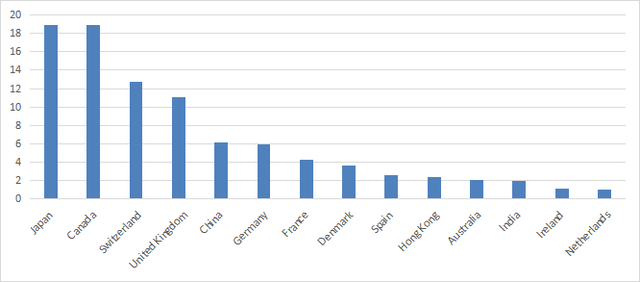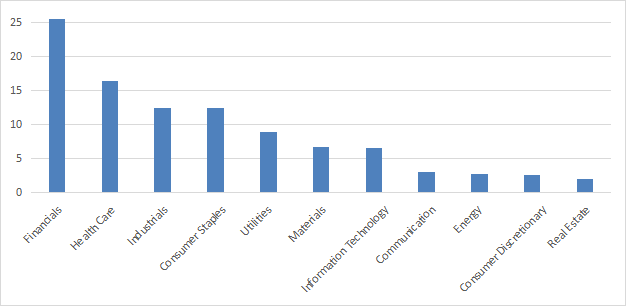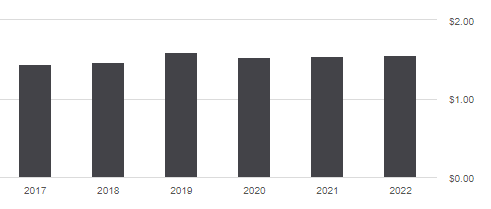IGRO: Global Dividend Growth ETF With Sub-Par Performance
Summary
- iShares International Dividend Growth ETF holds over 400 global stocks with growing dividends.
- It is well-diversified across countries and holdings, but not so much across sectors.
- It has been lagging at least four competitors in total return since inception.
- Moreover, the dividend growth rate is far for offsetting inflation.
- Quantitative Risk & Value members get exclusive access to our real-world portfolio. See all our investments here »

ChristianChan
This article series aims at evaluating ETFs (exchange-traded funds) regarding the relative past performance of their strategies and metrics of their current portfolios. Reviews with updated data are posted when necessary.
IGRO strategy and portfolio
iShares International Dividend Growth ETF (BATS:IGRO) has been tracking the Morningstar Global ex-US Dividend Growth Index since 05/17/2016. It has a portfolio of 403 stocks, a 12-month distribution yield of 2.35% and a total expense ratio of 0.15%. Distributions are paid quarterly.
As described in the prospectus by iShares, eligible companies must:
- pay a qualified dividend,
- have at least five years of uninterrupted annual dividend growth,
- have an earnings payout ratio of less than 75%,
- not be in the top decile of the Morningstar Global Markets ex-US Index ranked on dividend yield.
The fund invests mostly in large and mega cap companies (about 84% of asset value). Europe represents about 45% of assets and the second region is Asia with 33%. Canada and Japan are tied in weight with 18.9%. Then, come Switzerland (12.7%) and the U.K. (11.1%). Other countries are below 7%. China and Hong Kong weigh 8.7% together, so direct exposure to geopolitical and regulatory risks related to China is moderate.

Geographical allocation in % (Chart: author; data: iShares)
Financials are the heaviest sector by far (25.5%), followed by healthcare (16.4%), industrials and consumer staples (12.4% each). Other sectors are below 9%.

Sector breakdown in % (Chart: author; data: iShares)
The top 10 holdings, listed below, represent 26.8% of asset value. No holding weighs more than 4% as of writing, so the risks related to individual companies are low.
Name | Weight (%) | Country | Exchange | Ticker* |
NOVARTIS AG | 3.51 | Switzerland | SIX Swiss Exchange | NOVN |
NESTLE SA | 3.26 | Switzerland | SIX Swiss Exchange | NESN |
ROCHE HOLDING PAR AG | 3.05 | Switzerland | SIX Swiss Exchange | ROG |
SANOFI SA | 2.73 | France | Nyse Euronext - Euronext Paris | SAN |
IBERDROLA SA | 2.51 | Spain | Bolsa De Madrid | IBE |
NOVO NORDISK CLASS B | 2.48 | Denmark | Omx Nordic Exchange Copenhagen | NOVOB |
BRITISH AMERICAN TOBACCO PLC | 2.37 | United Kingdom | London Stock Exchange | BATS |
ROYAL BANK OF CANADA | 2.34 | Canada | Toronto Stock Exchange | RY |
TORONTO DOMINION | 2.28 | Canada | Toronto Stock Exchange | TD |
NATIONAL GRID PLC | 2.24 | United Kingdom | London Stock Exchange | NG. |
* Tickers in primary exchanges. Some of them have ADRs listed in the U.S.: to find them, copy and paste the company name in Seeking Alpha’s search box.
Past performance compared to competitors
The next chart plots the total return of IQDG and four non-hedged international dividend growth ETFs:
- Invesco International Dividend Achievers ETF (PID), reviewed here,
- Vanguard International Dividend Appreciation ETF (VIGI), reviewed here,
- WisdomTree Global ex-U.S. Quality Dividend Growth (DNL), reviewed here,
- WisdomTree International Quality Dividend Growth Fund (IQDG).
The chart starts on 6/1/2016 to match all inception dates.

IGRO vs competitors since June 2016 (Seeking Alpha)
IGRO is the worst performer among these funds. However, it has beaten one of them (PID) in the last 12 months:

IGRO vs competitors, last 12 months (Seeking Alpha)
The annual sum of distributions has been almost unchanged between 2017 and 2022, from $1.44 to $1.55 per share. It is a growth of 7.6% in 5 years, while the cumulative inflation has been about 20% (based on CPI).

Distribution history (Seeking Alpha)
Takeaway
iShares International Dividend Growth ETF holds over 400 global stocks with growing dividends. The heaviest countries are Japan, Canada, Switzerland and the U.K. It is well-diversified across countries and holdings, but not so much across sectors: a quarter of assets is in financial companies. Performance since inception is underwhelming: the fund has been lagging at least four competitors in total return, and the dividend growth rate has been unable to keep pace with inflation.
Quantitative Risk & Value (QRV) features data-driven strategies in stocks and closed-end funds outperforming their benchmarks since inception. Get started with a two-week free trial now.
This article was written by
Step up your investing experience: try Quantitative Risk & Value for free now (limited offer).
I am an individual investor and an IT professional, not a finance professional. My writings are data analysis and opinions, not investment advice. They may contain inaccurate information, despite all the effort I put in them. Readers are responsible for all consequences of using information included in my work, and are encouraged to do their own research from various sources.
Analyst’s Disclosure: I/we have no stock, option or similar derivative position in any of the companies mentioned, and no plans to initiate any such positions within the next 72 hours. I wrote this article myself, and it expresses my own opinions. I am not receiving compensation for it (other than from Seeking Alpha). I have no business relationship with any company whose stock is mentioned in this article.
Seeking Alpha's Disclosure: Past performance is no guarantee of future results. No recommendation or advice is being given as to whether any investment is suitable for a particular investor. Any views or opinions expressed above may not reflect those of Seeking Alpha as a whole. Seeking Alpha is not a licensed securities dealer, broker or US investment adviser or investment bank. Our analysts are third party authors that include both professional investors and individual investors who may not be licensed or certified by any institute or regulatory body.


